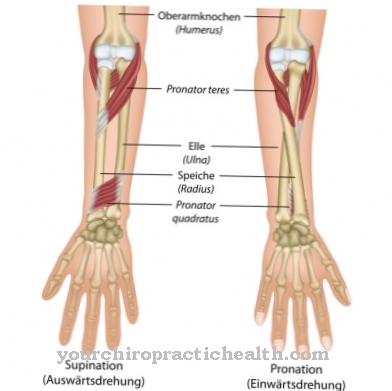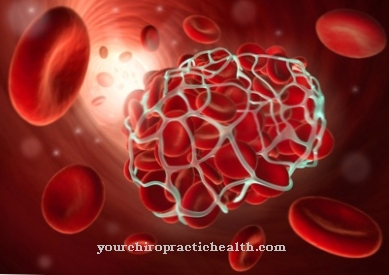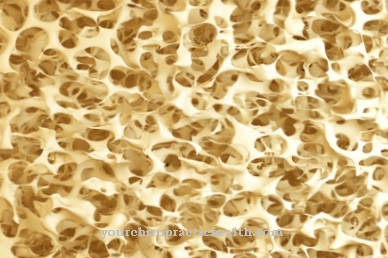The Saliva production or Salivation takes place in the oral cavity through the numerous small salivary glands in the oral mucosa and three large salivary glands also located in the oral cavity. Since saliva, in addition to its physical functions, also performs important biochemical tasks in terms of digestive induction (sugar), defense against infection and the relief of pain sensations, saliva production in the optimal amount and composition is extremely important. Saliva production is controlled by the autonomic nervous system.
What is the salivation?
.jpg)
The saliva production and secretion into the oral cavity takes place in the approx. 600 to 1,000 "small salivary glands" (glandulae salivariae minores) distributed in the oral mucosa, which are counted among the palate glands, and the three paired "large salivary glands", the parotid gland ( Glandula parotis), the submaxillary gland (Glandula submandibularis) and the sublingual gland (Glandula sublingualis).
The saliva in the mouth consists of 95% water and only 0.5% dissolved substances, but the substances dissolved in the saliva are contributed by the individual salivary glands in different concentrations and compositions, so that it is important that all salivary glands are functional contribute to the optimal amount and composition of saliva.
The small salivary glands produce a slimy secretion, especially in the area of the soft palate and uvula, while the fluid secreted by the paired parotid glands consists of an aqueous solution in which proteins and enzymes (especially amylase to break down certain carbohydrates) and immunoglobulins to ward off infections are resolved. Numerous electrolytes and minerals such as magnesium, potassium, calcium, iron and many others can also be detected in saliva.
The mandibular salivary glands, which are also paired, produce (secrete) the main part of the saliva. These are seromucous glands that contribute enzymes and proteins as well as mucous secretions. The secretion of the sublingual glands is purely mucosal, it consists of thick saliva.
Function & task
The main task and function of saliva production is to make saliva available in the optimal amount and composition at the optimal time in the oral cavity. On average, the salivary glands produce 0.5 to around 1.5 liters of saliva per day. Even if there is no food intake, a basic amount of about 0.5 liters is secreted.
On the one hand, the saliva itself, through its mucus content, ensures that processes such as swallowing, speaking, tasting and smelling are possible; on the other hand, the saliva prevents infections through its content of endogenous antibacterial and antimycotic enzymes and hormones. Digestive enzymes such as amylases initiate the breakdown of carbohydrates.
The slightly alkaline character of the saliva combined with traces of fluoride and rhodanide reduces the risk of tooth decay and helps to preserve the tooth enamel. Opiorphins, the body's own opioid analgesic substances, have also been detected in saliva.
The body partly uses the saliva production to flush waste or harmless substances out of the body via the lymphatic system. Special emotional situations such as stress, joy, anger and fear can be detected in the saliva through the concentration of certain hormones. For example, in stressful situations, the cortisol content in saliva increases sharply.
Steroid hormones - including sex hormones - can also be detected in saliva. So z. B. When sexual arousal kisses have a stimulating effect on the partner, as small amounts of sex hormones are mutually transmitted. A self-reinforcing control loop occurs if the process is not consciously interrupted by one of the two partners.
You can find your medication here
➔ Medication for bad breath and bad breathIllnesses & ailments
The main complaints related to saliva production can be over- or underproduction of saliva. In principle, this can be due to malfunctions or diseases of the glands themselves or caused by signals from the autonomic nervous system that are too weak or too strong. Overproduction of saliva (hypersalivation) can have many causes. The abnormally increased saliva production often occurs in connection with neurological diseases such as Parkinson's disease and amyotrophic lateral sclerosis (ALS). Diseases such as schizophrenia and manic depression are usually accompanied by disorders of saliva production. Increased salivation is listed as a side effect for a variety of drugs. Toxic substances, which are associated with parasympathetic disorders, can have a similar effect.
Insufficient saliva production (hyposialia) can result from a lack of fluids, from special diseases such as B. caused by Sjögren's syndrome, medication or radiation in the head area. Hyposialia manifests itself as an unpleasant dry mouth (xerostomia).
The impaired saliva production can also be the result of a direct bacterial or viral disease of the salivary glands such as mumps or the result of inflammation of the glands. Basic illnesses such as acquired immune deficiency (e.g. AIDS), increased blood sugar levels and hormonal disorders can also have an impact.
In rare cases, the outflow of saliva from the glands can be obstructed due to salivary stones. Salivary stones are usually formed from calcium apatite. Protein and vitamin deficiencies, alcohol and nicotine abuse also have an influence on impaired saliva production.
Tumors can develop, especially in the parotid glands, which, however, are benign in about three quarters of cases. Typically, the tumors grow only slowly and initially cause only minor discomfort. The rarer tumors, on one of the two mandibular salivary glands or on one or more of the small salivary glands, are often malignant and usually manifest themselves in pain, facial nerve paralysis and visible and palpable lumps in the mouth and neck area.





.jpg)







.jpg)

.jpg)
.jpg)










